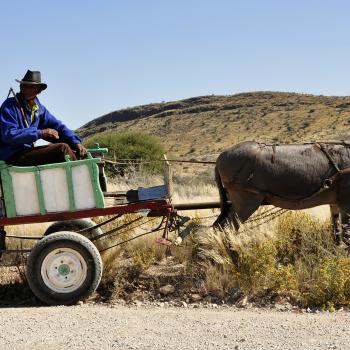Marty rides in Clark’s wagon to the Grahams’ home, where the preacher is.
Marty sat stiff and mute beside him as the wagon jostled on. She struggled to lift a hand and push breeze-tossed hair back from her hot face. He looked at her with concern in his eyes.
“Won’t be too long now. It’s powerful hot in the sun. Ya be needin’ a bonnet to shade yer head.”
I quote this bit to highlight two things: First, this feels like confirmation that Marty and Clem came out here completely unprepared. What did she do during the weeks she spent on the wagon trail? Burn? Second, Clark is genuinely concerned about her. He’s a genuinely good person—he thinks of others, he cares, he’s sensitive to her loss.
Marty, though? Marty doesn’t care.
She wanted no sympathy from this stubborn man beside her.
So, they get to the Grahams. Here I want to note two things. First, when Clark tells the preacher and the Grahams that “we’ve decided to marry up” Marty gets all angry:
“We! she stormed within herself. Ya mean you.”
Marty has gone through a severe trauma in the past twenty-four hours. Being upset with Clark seems almost like a coping mechanism. It gives her an emotion other than grief to feel—anger. And in that sense it feels very, very real. Marty is wrong, in a technical sense—she was part of this decision—but her response is understandable. She needs to feel angry.
Second, Clark and Marty don’t tell anyone about the deal they’ve made—that Clark will give Marty the money to head back east come spring. Instead, the revelation goes like this:
“It will mean a home for Mrs. Claridge here an’ a mama for my Missie.”
She heard Mrs. Graham’s “It’s the only sensible thing to be a doin'” and the preacher’s “Yes, yes, of course.”
Like I mentioned last week, the deal where Marty gets to leave in the spring makes no sense. This? This makes a lot more sense. It does make me super curious whether Clark is hiding those aspects of his bargain with Marty—does he not want anyone else to know?
It feels like we have two competing stories sort of clumped together that don’t quite fit. Everyone else thinks Marty is here to stay—a storyline which makes sense. Between the two of them, at the same time, Clark and Marty have a different storyline going on—one where she can leave come spring (and boy does she plan to).
Marty, by the way, seems to disassociate here:
She must have uttered her own responses at the proper times, for the preachers words came through the haze, “… now pronounce you man and wife.”
And then, when they sit down to eat after the ceremony:
She felt like a puppet, moving, even speaking automatically—being controlled by something quite outside of herself.
If this were Farris, I might assume that there was some intentional removal of agency here. If this were Rivers, with her history in this area, I’d definitely think that. But this is Oke, and what she’s been describing seems more real than either of their writing.
And hey look, I found this on a government health website:
People who experience a traumatic event will often have some degree of dissociation during the event itself or in the following hours, days or weeks. For example, the event seems ‘unreal’ or the person feels detached from what’s going on around them as if watching the events on television.
One quick complaint about the Grahams’ though. I forgot to check when this book was written when I did my first re-read last month, and it was this bit that brought me up and made me go check:
Children seemed to be all around. She didn’t even try to ascertain how many.
It turns out that the book was written in 1979, but this line feels like something out of a fecundity-focused fundamentalist Christian homeschool culture, perhaps written in the late 1990s, not something written in 1979.
And it happens over and over. When Marty and the other adults sit down to eat after the ceremony, we get this random statement:
The children must have been fed by the older girls before the grown-ups arrived home from the funeral.
Okay, confession time: these lines could have been pulled verbatim from a book I wrote when I was about 13. It was fiction. In it, a kid from the ordinary present gets shipwrecked on an island populated by fundamentalist homeschooling families who have left the mainland to run their own secret colony. (I was inspired by The Twenty-One Balloons.)
In my story, each family on the island had an average of around a dozen kids, all of whom were raised to do copious amounts of chores. Our protagonist is taken aback by the multitudes of children underfoot, and shocked to find that the older kids clear the tables after meals without being asked, while the adults are still socializing.
Perhaps that is why Oke’s random references to Ma Graham’s large number of children and their helpfulness around the house feel to me like an attempt to make some kind of point: when I wrote a book full of similar lines, I absolutely was trying to make a point.
What’s that? You want to read my whole story? Nope. Not happening. But, fine: I’ll spoil the ending: our protagonist is impressed by how orderly and obedient the children are, by how little rebellion or bad behavior there is, by how perfect and godly everything is. He converts, and returns to the mainland to bring his parents to the island.
No, I know. That would never happen.
Ever.
What can I say. I was 13.
And yes I’m kind of horrified now.
Okay, we’re moving on now.
As Clark and Marty prepare to leave, Ma Graham tells Sally Anne to go wake Missie from her nap. Sally Anne returns with “a slightly rumpled little figure” who reaches out to Clark “with a glad cry and outstretched arms.” Clark “swept her up against his chest and for a moment placed a cheek against hers.” Clark is a loving, involved father.
A loving, involved father who has just promised to hand Missie off to a stranger and never see her again come spring. Yes, I’m still on about the fact that that does not make sense.
As they leave, Marty notes that Ma Graham doesn’t congratulate her on her marriage or make any other such statement. She’s grateful, because she’d pretty sure that if anyone said anything at this point she’d burst into tears. But no-one does.
These pioneer people were sensitive to the feelings of others.
Marty later learns that Ma Graham herself “married up” in circumstances very similar to Marty’s. Ma Graham is sensitive to what Marty is going through because she went through something similar herself. And though Marty hasn’t really put it together yet, the same is true for Clark, who lost his own wife only about six months before.
These pioneer people are sensitive to the feelings of others because they’ve been there themselves, and they remember how it felt.
As they leave, Ma Graham tells Marty she’ll visit in a few days. Clark, Marty, and Missy get in the wagon and head to Clark’s homestead, which is close by.
Clark’s homestead has a “small but tidy cabin,” a “sturdy log barn,” a “chicken house,” and a variety of other outbuildings, as well as horses, cattle, and pigs. Marty muses that “it looked os much like the dreams that she and Clem had shared,” which is a very painful thought, but I’m left thinking, no, sorry Marty, but you and Clem would never have made it.
I don’t know much about Clem, but everything I do know suggests that he was not prepared for the realities of the West. I mean good grief, Marty didn’t even have a bonnet.
One of the mysteries about this book—for me at least—is how Clark managed to set himself up so successfully. Life on the frontier was hard. His cabin, by the way, has a kitchen, a sitting room, and a bedroom, each distinct from the other. This is not the first cabin those on the frontier tended to construct. Cattle, horses, pigs, chickens—this is a lot.
Pa Wilder was never this successful.
This story could have gone in several different directions here. Marty could have gone with Clark to his homestead to find that it consisted of a run-down sod house, a horse, a few chickens, and some fields half-broken for planting. Instead, she comes to Clark’s homestead to find a fully mature, extremely successful farm in perfect working order.
We’re not told how old Clark is—or, indeed, anything about his background. We learn that Ellen, his first wife, died when she was only twenty. I’m no expert on farming in the American West, but this homestead doesn’t sound like something built in two or three years. Perhaps Clark is significantly older than Ellen and started his homestead long before meeting her. Where did Ellen come from, then? It’s never suggested that Missie has any maternal relatives in the area. While I don’t think it’s ever stated directly, I got the impression that Clark and Ellen came on a wagon train, like Marty and Clem did.
Clark’s extreme success makes little sense unless he’s been at it for a decade already—and had financing for getting started. You can construct a backstory where this is the case. Perhaps Clark had humble but hard-working roots, was gifted a large inheritance by a maternal great-aunt, and then decided to prove to himself that he could make it as his own person, outside of his father’s humble but hard-working success in the east.
In this scenario, you might imagine that Clark had a younger sweetheart who wasn’t old enough to come West yet, whom he later sent for to join him. She’d have had to be much younger—perhaps she was a young second-cousin, or someone else he felt an obligation or attachment to and turned to when he eventually needed a wife. Or maybe he just asked his parents to choose and send him someone, not having time to court himself.
I want a backstory very, very badly, and Oke never, ever offers one. It’s driving me batty. All we know is that Clark has a very, very nice homestead and is very, very successful. Cool. And Marty has now arrived at his very-successful homestead.
Clark helped Marty down and spoke gently. “Ya best git ya in out of the sun and lay yerself down a spell. Ya’ll find the bedroom off’n the sittin’ room. I’ll take charge of Missie an’ anything’ else thet be needin’ carin’ fer.”
I mentioned earlier that Oke could have had Marty come home to a sod house and a hard dose of reality about life in the West, which could have gone in interesting directions. Oke has made other choices as well. She could have made Clark a fairly distant father, leaving Marty to find ways to turn Clark’s heart toward Missie (that might have made the deal they struck make more sense too). She could hve made Clark gruff in general, and given Marty the role of breaking through his defenses and softening him.
It’s not like there aren’t a million and one romance novels laid out that way, after all.
Instead, Oke chose to create a person who is sensitive, gentle, and caring. If I expressed concern about what fangirls of Rivers’ Voice in the Wind series might be looking for in a man after swooning over Marcus, there is no such concern here. Clark may have married Marty to get someone else to handle the childcare and cooking, but it’s not because he’s not completely capable of doing those things himself. He is, and then some.
I have a Patreon! Please support my writing!















